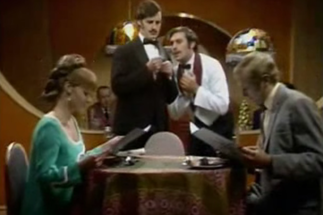Written by Joel T. Lewis Series 1 Episode 3 'How to Recognize Different Types of Trees from Quite a Long Way Away' Sketch List Court Room Sketch Bicycle Repair Man Children’s Stories Restaurant Sketch Milkmen Stolen Newsreader Nudge Nudge Monty Python’s famous Restaurant Sketch answers that age old question: what level of interest and shame should a customer service representative express when the customer is not afforded every little thing their heart desires. The answer that the Pythons’ provide is both outrageous and glorious in its absurdity and hyperbole. The setting is rather accessible: a restaurant patron and his date (Graham Chapman and Carol Cleveland respectively) sit down at a three star restaurant and the formalities of sitting down and examining the menu are handled with great care. The scene drastically inverts the expected roles of patron and host as Chapman very politely asks for a clean fork as his is a bit dirty. After gushing apologies, the host (played by Terry Jones) ushers the head waiter (Michael Palin) to the table. Further apologies follow, Palin suggests firing the entire washing-up staff, and ushers in the appearance of the Manager (Eric Idle). The appearance of every level of the restaurant chain of command comes unprompted from a confused Chapman who insists at every level that he doesn’t want to make a fuss. Idle bears his soul to the customers in apology, referring to the difficulties of the restaurant staff, citing war wounds and arthritic fingers as the cause of the less than perfect presentation of the cutlery. Idle collapses in tears prompting the appearance of a towering cleaver-wielding John Cleese as Mungo the chef, whose chef’s hat adds nearly a foot to his already massive height. Cleese’s appearance and performance in this sketch is its own study in comedy and commitment. With his height, his demeanor, and the delivery of his lines Cleese embodies all the frustration, unjust or otherwise, of customer service representatives everywhere. He spits his lines out at Chapman, venomously referring to his (Chapman’s) reasonable request as, “Petty, feeble, quibbling” and, transitioning from frustration to anguish to madness, punctuates his first speech by slamming his cleaver (which had been hidden from the camera till this point) into the middle of the table. This and the frenzy of the manager’s ashamed suicide and Mungo’s attempts to slay the customers with his cleaver that follow, illustrate the crux of the joke the troupe has been making: the customer/customer service relationship is enough to drive you mad as the customer too often sees the customer service provider as a means by which service is rendered, rather than a human being with desires, feelings, and rights. The sketch so effectively flips the hyperbole and outrage expressed by customers we’ve seen in real life that it makes you reevaluate how you view customer service. You don’t need to give a waiter or a desk clerk your life story, you don’t need to have a 6 foot chef yell at them about what a saint you are, and you don’t really need to see the Host, Head Waiter, and the Manager over the cleanliness of your fork. But, perhaps, as the punchline of the sketch suggests, all that might have been necessary had you cared to mention your dirty knife as well.
0 Comments
Leave a Reply. |
Archives
April 2025
|
|
© 2012-2025, Nerds That Geek LLC.
All Rights Reserved. |
uWeb Hosting by FatCow

 RSS Feed
RSS Feed